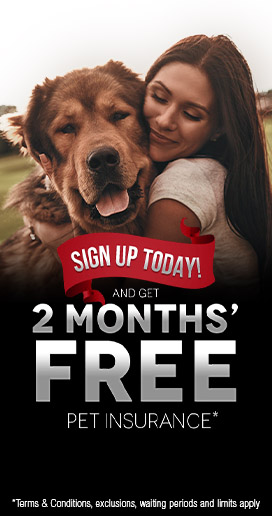
Warning – Social Media & Cute Pet/Children Posts
Pet Insurance Australia, in collaboration with a leading behaviour veterinarian, Dr. Lewis Kirkham, is issuing a warning concerning cute pet and children posts on social media.
“It has become increasingly common in many people’s social media feeds – images and videos showing pets interacting with small children and babies,” says Nadia Crighton from Pet Insurance Australia. “However, for those of us who understand pet behaviour and body language, many of these videos and images are truly alarming.”
Regrettably, many children sustain unnecessary injuries due to unsuspecting and trusting owners who do not comprehend pet behaviour. Children must be under 100% supervision when around any dog or cat, ensuring the safety of both the child and the pet.
Leading behaviour vet Dr. Lewis Kirkham also concurs that pet owners should set aside their cameras and properly supervise their pets during interactions with children. As a dedicated veterinarian and author of “Tell Your Dog You’re Pregnant: An Essential Guide for Dog Owners Expecting a Baby,” and “Tell Your Cat You’re Pregnant: An Essential Guide for Cat Owners Expecting a Baby,” Dr. Kirkham is concerned about the influence social media is exerting on pet owners, impacting the decisions they make in pursuit of a great shot.
“I am often tagged on social media in what are perceived as ‘cute’ videos of unsupervised babies interacting with dogs,” he comments. “Many of these are deeply concerning to those who can accurately interpret a dog’s anxious body language.”
Common Signs a Dog is Anxious:
• Moon eyes (whites of the eyes are visible)
• Avoiding eye contact
• Moving away from the child or freezing
• Tucked ears or tail
• Yawning
• Panting
• Licking (lips or the child)
Common Signs a Cat is Anxious:
• Inappropriate toileting
• Hiding
• Crouching
• Hissing/growling
• Overgrooming
“With recent reports of dog attacks on children, it’s crucial for pet owners to comprehend their pet’s behaviour and the signals they display when feeling stressed,” Crighton emphasises. “A child can be a bewildering source of energy for a dog or cat, and unless they are appropriately socialised and prepared for a baby, such interactions can prove catastrophic for parents, children, and pets alike. Pet owners cannot merely assume that their pet will react in a certain way in a given situation, especially if the pet has never encountered the stimulus before, including newborn babies and children.”
Subjecting pets to undue stress for the sake of social media videos or images could trigger an unwanted response in your dog or cat, potentially resulting in the pet being excluded from the family, placed in a shelter, or even euthanised.
Many social media videos depict dogs with wide moon eyes, licking babies, and appearing visibly anxious during the interaction.
“The dog often actively tries to evade the baby, avoids eye contact, and may even lick them to push them away,” notes Dr. Kirkham. “These signs are frequently overlooked by the person behind the camera. Ensuring pets are supervised and kept within arm’s reach at all times is imperative to prevent incidents. In my view, a video of a baby alone with a pet is equivalent to being ‘unsupervised’.”
Pet owners are strongly encouraged to study pet behaviour and seek assistance from trained professionals if they notice any signs of undesirable behaviours.
“In this realm of responsible pet ownership, education is paramount,” says Crighton. “Many times, pet owners fail to recognise the signs, especially if they have never encountered any behavioural issues with their pet before.”
Preparing Pets for a Newborn Baby:
Expectant parents can also better prepare their existing pets for the arrival of a new baby.
“The great news is that there are exceptional resources available that can help pets acclimate to a new addition to the household,” Crighton points out. “This should be undertaken as soon as you learn you’re expecting – the better prepared your pet is, the smoother the transition.”
Understandably, many devoted pet owners don’t fully grasp the significant impact a baby can have on their pet’s environment until the baby arrives home. This can lead to behavioural problems and significant stress in an already tired household.
Dr. Kirkham recommends remaining vigilant for any signs when the baby arrives home and urges all expecting pet parents to prepare during pregnancy to better equip their pets for the upcoming changes.
“If the pet becomes overtly fearful or anxious – including barking in dogs or hiding in cats – intervention by a qualified behaviour vet is advised,” he suggests. “Cats may start urinating indoors or spending more time outside. Both cats and dogs might fixate on or become aggressive toward the baby. In such cases, prompt intervention by a qualified behaviour vet is recommended.”
Featured By
Photo by Josh Rakower
Nadia Crighton is a renowned and accomplished professional in the fields of Journalism, Public Relations, and Writing, with an extensive career spanning over 25 years, 20 of which have been dedicated to promoting the health and well-being of pets.
Get the latest Pet Insider Tips & News
We offer award-winning* pet insurance policies to protect your furry friend’s health and wellbeing. Get a quote today and give your pets the care they deserve.
Archives
Categories
- Cat Care (65)
- Cats (2)
- Dog Care (129)
- Guides (29)
- Health and Nutrition (201)
- Lifestyle and Activities (221)
- Media Release (27)
- Pet Care (251)
- Rescue Dogs (1)


